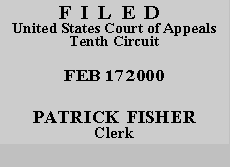

Plaintiff-Appellant,
v.
HERBERT NYE, Sheriff, Leavenworth County; (NFN) ADAMS, Sheriff's Deputy Sergeant; (NFN) HOLMES, individually and in his official capacity as Deputy Sheriff's Sergeant; (NFN) SPARKS, Deputy Sheriff's Lieutenant of Leavenworth County; JOHN DOE, Sheriff's Deputy, midnight shift,
Defendants-Appellees.
Plaintiff-Appellant,
v.
MICHAEL A. NELSON, Warden, El Dorado Correctional Facility; CHARLES SIMMONS, Secretary of Corrections; JOHN NYSTROM, Food Service Manager, El Dorado Correctional Facility; RONALD DOW, Clinical Chaplain, El Dorado Correctional Facility,
Defendants-Appellees.
We have jurisdiction under 28 U.S.C. § 1291. We review the grant of summary judgment de novo, applying the same standard as the district court under Fed. R. Civ. P. 56(c). See Craig v. Eberly, 164 F.3d 490, 493 (10th Cir. 1998). Under Rule 56(c), summary judgment is appropriate "if the pleadings, depositions, answers to interrogatories, and admissions on file, together with the affidavits, if any, show that there is no genuine issue as to any material fact and that the moving party is entitled to a judgment as matter of law."
In district court No. 96-3198-JTM, plaintiff alleged that while he was incarcerated in the Leavenworth County Jail: (1) he was sexually assaulted by another inmate; (2) he was beaten, pepper-sprayed, or otherwise subjected to improper physical abuse or excessive force by jail personnel; (3) he was denied a kosher diet required by his orthodox Jewish faith, in violation of his religious rights; and (4) his legal materials were destroyed by jail personnel. In district court No. 96-3109-JTM, plaintiff alleged that while he was incarcerated at El Dorado Correctional Facility: (1) he was denied a kosher diet, in violation of his religious rights; and (2) he was subjected to cruel and unusual punishment by being placed in administrative segregation.
Plaintiff filed a verified complaint in each case, and each complaint must therefore be treated like an affidavit. See Green v. Branson, 108 F.3d 1296, 1301 & n.1 (10th Cir. 1997). Nevertheless, "conclusory and self-serving affidavits are not sufficient." Hall v. Bellmon, 935 F.2d 1106, 1111 (10th Cir. 1991). When "the record taken as a whole could not lead a rational trier of fact to find for the non-moving party, there is no genuine issue for trial." Matsushita Elec. Indus. Co. v. Zenith Radio Corp., 475 U.S. 574, 587 (1986) (quotation omitted).
The district court found that plaintiff's factual allegations were insufficient to sustain his claims in the face of defendants' evidence. On appeal, plaintiff argues in a conclusory fashion that he did not have a fair chance in the district court to submit evidence to support his claims. We have carefully reviewed the parties' materials and the record on appeal. We find no error in the district court's decision in either case, and affirm its judgments for substantially the same reasons as those set forth in the district court's thorough and well-written orders filed on February 9, 1999.
AFFIRMED. The mandate shall issue forthwith.
Entered for the Court
Circuit Judge
*. This order and judgment is not binding precedent, except under the doctrines of law of the case, res judicata, and collateral estoppel. The court generally disfavors the citation of orders and judgments; nevertheless, an order and judgment may be cited under the terms and conditions of 10th Cir. R. 36.3.
1. After examining the briefs and appellate record, this panel has determined unanimously that oral argument would not materially assist the determination of these appeals. See Fed. R. App. P. 34(a)(2); 10th Cir. R. 34.1(G). The cases are therefore ordered submitted without oral argument.